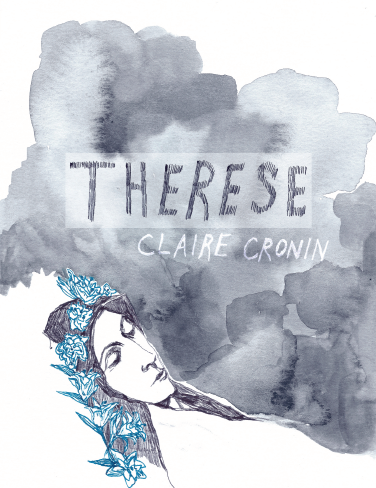Laudanum Chapbook Anthology: Volume Two – Abigail Parry, Kimberly Campanello, Frances Lock, ed. by Tiffany Anne Tondut
– Reviewed by Becky Varley–Winter –
Tiffany Anne Tondut notes that the three chapbooks in this Laudanum Chapbook Anthology are ‘zanily disparate’. Abigail Parry gives zestful versions of Spanish love poems, while Kimberly Campanello makes found texts from the traumatic records of an Irish maternity home. Frances Lock’s Pikey is the only text that leans entirely on the poet’s own freewheeling voice, but all three poets work between different kinds of language, circling a sense of place. Tondut identifies the ‘question of belonging’ as their uniting concern, but not-belonging sits inside this question as a rogue seed.
Abigail Parry’s Death by Hearts and Flowers opens the anthology on a cheerfully-doomed note, translating a poem by María Do Ceo (1658–1752): ‘Cover me over / with violets and roses, I’m dying, / I’m dying of love’. It’s the most beguiling way to go: love in these poems is unrequited and addictive. It’s a shame that the original Spanish can’t be included alongside Parry’s versions, as she clearly takes poetic license with her source texts. José Cadalso lived from 1741–1782, so it’s unlikely that his original sounds much like ‘The Poet Has Had Just About Enough of Love’:
Piss off, Love. I’ve had enough –
I can’t go round again.
You’ve never brought me anything
but poison, snakes and chains.I’ve had to have my stomach pumped,
I’ve had to grind the locks;
you’ve left me in an underpass
and shipwrecked on the rocks.
Parry deliberately dislocates a sense of time and place: ‘poison, snakes and chains’ and ‘shipwrecked on the rocks’ are more archaic, while ‘Piss off’, ‘stomach pumped’ and ‘underpass’ feel rooted in the present. Where do these poems belong? The extent to which older works should be updated is questionable; attempts to translate Shakespeare into modern English tend to grotesquely simplify his meaning, or lose it altogether, stripping away original beauty. However, I appreciate Parry’s poems in their own right. She calls them ‘versions’ rather than ‘translations’, due to the ‘extravagant liberties’ they take, and notes how neatly the sensibilities of Ventura Ruiz Aguilera’s Cantares can be grafted onto 1950s pop songs. She playfully titles her translation of his works ‘Jukebox’, giving each poem a 1950s title (‘Bye Bye Love’, ‘Lonesome Town’), setting them to the rhythms of Buddy Holly. She argues that the frustrations of lust and love are so fundamental that they are in fact supremely translatable, a record that won’t stop playing, repeating over centuries. Only the textures of communication change. This very familiarity challenges these poems’ ability to fascinate, but Parry takes a bracing, vigorous approach, giving each cover version her own twist, and aiming for a breathless pace.
While Parry’s work feels restless and devil-may-care, Campanello sinks deeply into silence and stillness, drawing on the painful legacy of a ‘Home’ which gave none of the safety that the word ought to suggest. St Mary’s Mother and Baby Home (Tuam, Galway) was run by the Bon Secours Sisters between 1926 and 1961. The mothers and babies endured abusive conditions, and 796 children died there. A nearby field contains their mass grave. MOTHERBABYHOME takes archival and contemporary sources, and, by erasing some words and highlighting and re-punctuating others, makes them into a jolting testament of pain. Each text is accompanied by a baby’s date of death, combining poetry and reportage into a sequence of paper gravestones. Campanello’s punctuation recreates the stuttering edge of emotion within statements of fact: ‘The,practice. was / to offer no pain re lief as suf-fering was regard.ed / as part ofher / punishment’. Lines are separated by tracts of white space, a strategy of écriture féminine that fits this subject, the mistreatment of maternal and infant bodies. Campanello manages to confront the frightening coldness of her material without exploiting it, surrounding it with restrained but palpable fury. The complete text is forthcoming from zimZalla as a boxed ‘report’; as well as remembering the dead, it also serves as an indictment of abused state and religious power. The selection presented here is already damning, and powerful.
Finally, Frances Lock’s Pikey reminds me instantly of the films of Andrea Arnold, in which women seek self-determination amid transient edge-lands and council estates. These poems have a style of their own, but are also vaguely reminiscent of Liz Berry’s work in their swirling embrace of colloquial language and registers of speech that are usually kept separate. Lock references James Joyce (Pikey is a ‘Portrait of the artist as a blonde no gentleman prefers’), and his mythic dailiness is a clear influence on her:
We been Burford. We been Savernake and Lavernock,
but this is a dark place, older than the sweat off Satan’s
back, […]
These poems have a strong sense of plot; they are full of rhyme and internal weaving, but also act as vignette-like chapters in a longer narrative. The female body is often subject to hostile hunger, navigating hope and threat: ‘I thought he was harmless’, the speaker says, ‘But I told him to go and he took out / a teary-eyed razor, slashed the air an inch from my / mouth.’ The touch of ‘teary-eyed’ captures the worn-away sadness inside this unpredictable violence.
Lock also has a quick eye for similes: ‘love comes rushing in of a sudden, love, like a funny / bone stunned’, or ‘Hindhead Tunnel opens up its blackish / mouth like a carpet bag.’ Her work is packed with invention and furtive, resilient joy: ‘I’m just one clapped hand from happy’. I instantly go to seek out more of her poetry. As a showcase of vivid voices, taking a range of different approaches, this anthology doesn’t disappoint. It’s also beautifully-designed, with a cover that looks like a smoky green cloud of feathers.





